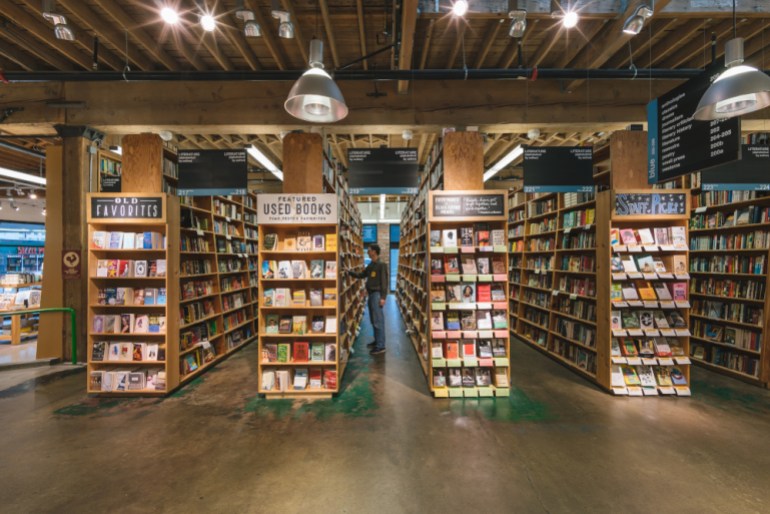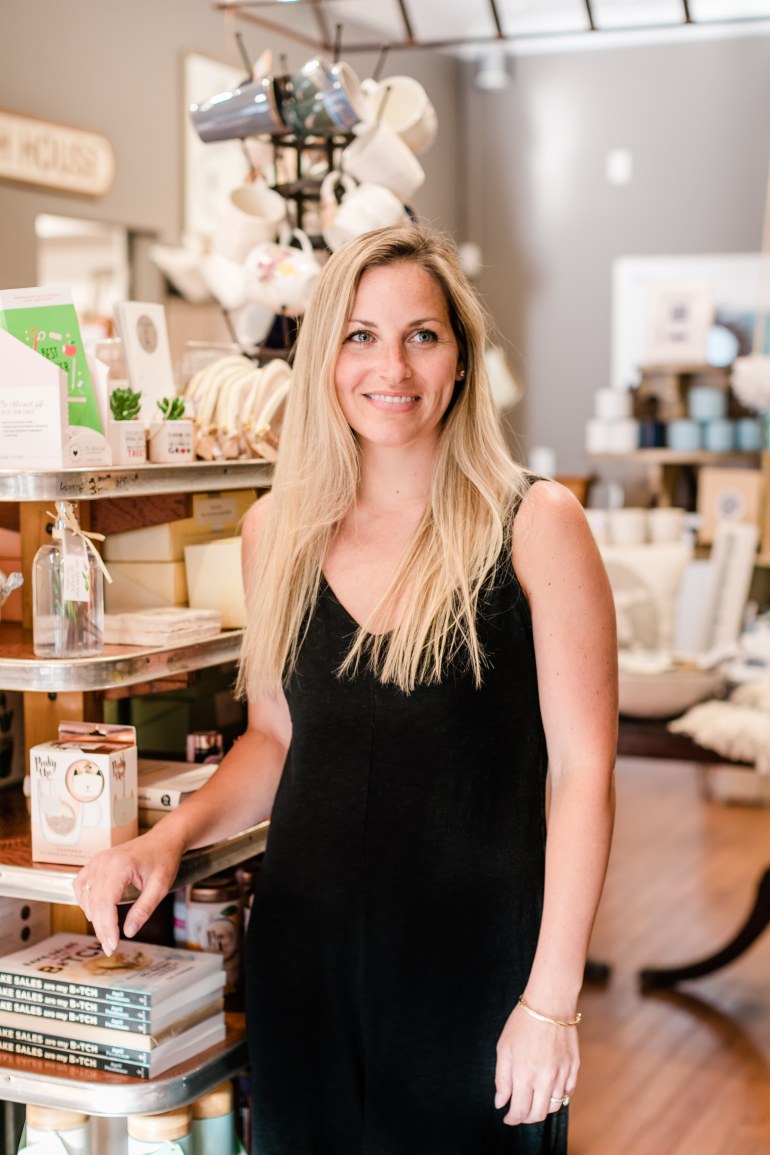US small businesses hustle amid Amazon’s ‘Christmas creep’
Amazon moved its Prime Day event to October, hastening the holiday shopping season. Now, small businesses are hustling to get some of those dollars in case COVID-19 forces them to close again.

Outside Meghan Lukin’s gift shop in Hoboken, New Jersey in the United States, people still stroll by in their T-shirts and display Halloween pumpkins on their front stoops.
But inside Washington General Store, the shelves are already stocked for Christmas. After Amazon.com Inc’s Prime Day event raked in record profits for the online retail behemoth this week, Lukin is hoping to catch some of those early holiday shoppers’ dollars for small businesses like hers.
Keep reading
list of 4 itemsTrump says he’d go bigger on stimulus, throws shade on Pelosi
‘Oppressive and dangerous’: Amazon workers take company to court
US recovery looks shakier with unexpected rise in jobless claims
“People usually get frustrated when we put holiday items out too early,” Lukin told Al Jazeera. “But this year, we decided to bring it up a little bit earlier to give those early shoppers some extra room, some extra time and try and spread out the holiday shopping experience altogether.”
Amazon.com and other retailers who started running online holiday deals this week are forecast to bring in $10bn in sales, surpassing last year’s Cyber Monday figures, which usually hit in November.
Now, small businesses that have struggled to keep their doors open all year amid the coronavirus pandemic are mobilising to get in on what’s been dubbed the “Christmas creep,” urging customers to shop small and early in case a second wave of COVID-19 infections forces them to close again.
Some small business owners are fans of Amazon and the extra business they have generated being third-party sellers who sell directly to consumers through the online behemoth’s platform.
But others worry that early Amazon Prime Day and online sales from big-box retailers will mean consumers have blown through their holiday budgets early, even as local businesses bank on those sales to pay their rents and their employees during the pandemic.
Emily Powell, the third-generation owner of Powell’s Books in Portland, Oregon, decided to put the writing on the wall. A billboard outside of her flagship store now reads: “Amazon’s gonna be fine, folks. Shop independent.”
Over the edge
About half of all American workers are employed by small businesses, defined as companies with 500 employees or fewer, according to the US Chamber of Commerce. But seven months into the coronavirus pandemic, more than 160,000 small businesses have closed, according to an analysis by the business review site Yelp.
The Paycheck Protection Program, the federal lifeline to help small and medium-sized businesses remain viable and keep workers in jobs, has expired. Talks between the administration of US President Donald Trump and Democrats in Congress for a new round of virus relief aid remain deadlocked and few expect a deal to be reached before the November 3 US elections.
That means small businesses have been without the help they relied on since the end of July.
Moreover, unemployed workers haven’t received the extra $600 federal top-up in state unemployment benefits, either. That translates into less disposable income for jobless US consumers to spend.

That pinch is felt harder by small businesses than big corporations like Amazon, which announced last month it was hiring an additional 100,000 workers in the US and Canada to keep up with pandemic demand.
Powell said that after working with Amazon for years, including as one of its first second-hand resellers, her company couldn’t keep up with the mega site’s low prices, free shipping or sales volume.
She severed her bookstore’s relationship with Amazon early on in the pandemic, costing her 50 percent of her e-commerce business but giving her more control over how to weather the storm.
“I think over the many years Amazon has been around and increasingly in our lives, they have trained us all to believe that products should be heavily discounted, that the price should be as low as possible, and that that doesn’t come with any cost,” Powell told Al Jazeera.
“Working with them, we were finding it increasingly challenging and detrimental to our own business, even while we relied increasingly on the revenue streams of those sales,” she added.
The pandemic has forced Powell’s to close one of its five stores permanently and lay off more than 300 of its 500 employees already. The company slashed the hours of its remaining stores to try to stay afloat, but tariffs on paper and ink – as well as supply chain disruptions from the pandemic – are poised to make this year’s holiday season particularly fraught for booksellers, Powell said.
Like many small businesses, the company also relies on order delivery by the US Postal Service, which has struggled to keep up with demand during budget cuts. Amid all of that, Powell is struggling to attract customers who could just order their books with a click from their phones instead.
“It’s this notion, I think, that, ‘Oh, I need a garden hose and I don’t want to go to my local shop,’ which we all understand,” she said.
Primed for business
But not all small businesses are leary of living in Amazon’s shadow.
Third-party sellers won big during this year’s Prime Day event, surpassing $3.5bn in sales – a nearly 60 percent year-over-year increase, Amazon said in a press release, adding that many of those sellers are small- or medium-sized businesses.
Toyin Kolawole is the founder and CEO of Iya Foods, an Aurora, Illinois-based company that produces seasonings, supplements, spices and mixes inspired by her Nigerian roots.
Kolawole said she has sold her products via Amazon’s platform since 2017, but she was approached by the company after the killing of George Floyd as part of its initiative to support Black-owned businesses.

“[Amazon] started coming to me with things they could [do] to support our business. They had a Black-owned page that they were promoting to support Black-owned businesses, and with Prime Day, it was taking it a step further by promoting minority-owned businesses on Prime,” Kolawole told Al Jazeera.
“It’s been great for us, because our business over the last two days has doubled.”
Kolawole said the fees Amazon collects on her sales depend on the type of product being sold and its weight, but can go as high as 30 percent. But she says it’s worth it to get her products in front of consumers, particularly when grocery stores in her area have been reluctant to stock her products.
“When I started this business and went to grocery store buyers, a lot of times, many buyers would ask me, ‘Well, we don’t know how many Africans shop our store, or we don’t really have an African section,'” she said. “And I would say, ‘Well, you have Greek yogurt in the aisles, you didn’t ask how many Greeks shop your store’.”
“When you face that kind of challenge and someone says, ‘Go sell on Amazon’ and you can literally just upload your products on Amazon without anyone asking you that question, at that point, Amazon becomes an opportunity,” she said.
Kolawole said the best thing consumers can do for small businesses this holiday season is to shop – and leave feedback that helps them improve.
“Every time a small business opens in my community, I make it a point of trying to at least patronise the place at least once,” she said.
Christmas crunch
It’s those loyal customers who Lukin is banking on to shop early this fall at Washington General Store. She said her company does 30 percent of its annual business in December alone, but worries what will happen as the number of coronavirus cases creep up in the community, which is just across the river from New York City.
The last round of lockdown measures forced Lukin to innovate, selling gifts over direct message on Instagram and delivering them in her mile-square city.

But her physical store was closed from mid-March to mid-June, causing her to miss out on Mother’s Day, her second-biggest sales day of the year.
Through relief from the federal Paycheck Protection Program and Hoboken city grants, she was able to keep her full-time manager on the books the entire time and bring her part-time workers back for some of the time.
This time around, she’s building out her website to handle online sales.
But she urged shoppers to consider how small businesses shape the look and feel of their city or town – explaining that retail stores’ success or failure has “a domino effect” on main streets across the country.
Without support this fall, shoppers could see streets lined with boarded-up windows or for rent signs in place of cheery window displays this December.
“The online platform that can get things to your door so quickly, they don’t come with the charm,” Lukin said “They don’t come with the smell. They don’t come with the friendly faces or the overall feel. We try and put a personal touch on every gift that we wrap. We have relationships with customers that you don’t get online.”
Powell agreed, saying the closures of small businesses could hollow out cities and towns in ways people haven’t even realised.
“We’re home, and so in many cases, we’re truly not seeing the fact that these businesses are closing and boarding up,” Powell said. “By the time we’re able to really be out and go back to our cities and our communities, either to shop or just to spend time, they will be gone.”